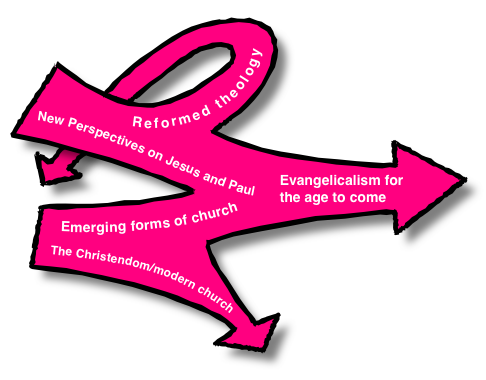Emerging or Diverging Church?
 Or perhaps: Fresh Expressions or Left Expressions?
Or perhaps: Fresh Expressions or Left Expressions?
I’m going to gently call out two people here. I don’t know them personally, but I’m picking up on some of their published comments that I have stumbled upon.
#1
The first is Andrew Perriman who considers the momentum of two movements in evangelicalism – the so-called New Perspective reading of the New Testament and the Emerging Church. He helpfully looks at the compatibility and synergy of these movements and shares some of my sympathy and excitement for them.
Unfortunately he couches his point in terms of the “demise” of other things. In this case of “modern evangelicalism”:
What these two developments signal, in my view, is the demise of a modern evangelicalism for which “church” is merely the slow and pointless accumulation of saved souls, and scripture just a massive, dense and largely impenetrable way of saying that God so loves you (singular) that he gave his only Son.
And then gets a self-confessedly simplistic polemic about the “neo-reformed.” He even diagrammatises it with a (pink, why is it always pink!) multi-headed arrow of the “Great Convergence.”
This has all been a great oversimplification, but in my more optimistic moments I imagine that the future of the people of God after Christendom lies not with the reactionary neo-Reformed folks, for all their good intentions, but in the convergence of these two powerfully creative forces. There, I said it.
#2
In Anglican circles Emerging Church is often stenciled with the brand of Fresh Expressions.
The second person I’ll interact with is David Muir who writes on “Why approving women bishops is important for fresh expressions.” He picks up on the women bishops issue as a touch point for contextualisation and writes:
This is vital for fresh expressions of church. How does God relate to a society which has championed the rights of women and drawn them into the highest leadership? How God revealed himself within societies that kept women out of high office, both in society and in the church, is not the point. The point is: what will best reveal the holy character of God in our setting? If Christians involved in fresh expressions of church don’t really get this, then whatever we do on the ground is just window-dressing for culture-warp Christianity that does not understand the depth of grace that is revealed to us in Holy Scripture.
#me
Now I’m not calling these two out because of what they espouse. I am actually quite sympathetic towards New Perspectives and I am not opposed to women in leadership (including episcopal leadership). What I am calling these two out on is the danger of conflating Emerging Church with non-core ideas.
Both “Fresh Expression” and “Emerging Church” have been buzzphrases which are (or at least have been) beautifully blank canvases.
They are not vacuous terms: We have all known the broad sense of what it’s about – they encapsulate the widely held concern about the (relative) failure of our forms of church to engage with Western society. They have tapped into the heart (including my own) of those who longed to see the devotion of church to gospel fire effectively catching others alight with it.
They are not unbounded terms: The blank canvas does have a frame – the biblical witness of the gospel of Jesus that is at the heart of both ecclesial freedom and the kerygma with which that freedom is meant to resonate with culture.
Practically speaking, the sense of “Emerging” and “Fresh” has been used to give permission to put off some of the barnacles and bureaucracies that were snuffing the fire out – it freed us from being bound to buildings and other overheads. It also meant permission to experiment – to try different things, and to fail – to go out preach and proclaim with awkward fumbling cultural linguistics – without risk of being discarded by or untied from the deeper, older ecclesiological wells.
Sometimes it has looked vastly radical (skate park church anyone?) and other times its been “just” a church plant with a new emphasis or even a simple shift in the attitude of an existing congregation grappling with a renewed surrender to the Holy Spirit. But these things were always examples of being Fresh or Emerging, not definitions encapsulating superfluous layers of pseudo-orthodoxy. Emerging Church may use, but must not be defined by an overly-particular theological framework (Perriman), or social issue (Muir).
Does Emerging Church require New Perspectives – No! There are plenty of ways of making Reformed Theology sing for this generation.
Does Fresh Expression require female episcopacy – No! It is not a fundamental requirement. Even conservative catholicism can be given an enlivened and enlivening form – particularly in the area of social justice and engagement with the marginalised.
A particular fresh expression will reach maturity and will coalesce and solidify – but take the movement with it and you lose the engine that made it possible. The whole thing only works if the canvas remains a blank canvas: you can’t re-imagine anything if the picture is already drawn.
Collapse the imagination and you have already reached the latest round of staid and locked-in. And the stage set for yet another round of the latest theo-political fight. That doesn’t feel very fresh to me.
